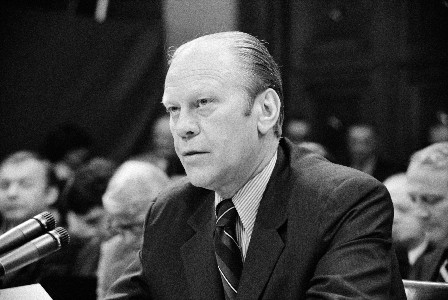Presidential Pardons

An explanation of the power to pardon granted to U.S. presidents by the Constitution
 President Gerald Ford testifying before the House Judicial Committee about his pardoning of former president Richard Nixon. Related Links |
In the waning days of a president's term, the outgoing executive often exercises the power to issue pardons. Some presidents exercise restraint, such as George Washington who only pardoned 16. Others, such as Ronald Reagan and Bill Clinton, have wielded the power generously, and some might say questionably, to reward political allies, friends, contributors, and rebels.
Presidential power to grant pardons, which is enumerated in Article II, Section 2 of the U.S. Constitution, is nearly unlimited and cannot be checked by any other branch of government. The pardons are not meant to correct a judicial error, such as a wrong conviction. Instead, pardons are intended for people who have atoned for their crimes and are thus being rewarded for good behavior, or for those who have completed their sentences. A pardon reinstates one's freedom to apply for certain jobs, such as in law enforcement, and exercise privileges, like carrying a gun or voting. All requests for executive clemency are directed to the Office of the Pardon Attorney at the Department of Justice. The Pardon Attorney investigates and reviews all applications before sending recommendations to the president.
Can the president pardon someone who has not been convicted of anything?
Preemptive or anticipatory pardons are used on occasion, usually with the belief they are serving a national interest. Such a pardon was issued to President Richard Nixon by President Gerald Ford. The pardon covered all the offenses Nixon "committed or may have committed or taken part in during the period from January 20, 1969 through August 9, 1974." Another preemptive pardon was issued a few years later by President Jimmy Carter, absolving any person during the Vietnam era that "violated the Military Selective Service Act by draft-evasion acts."
Pardons and Controversy
Pardons have historically been used to help the nation move forward. In 1992, during his final days in office, President George H.W. Bush wrote,
"When earlier wars have ended, Presidents have historically used their power to pardon to put bitterness behind us and look to the future. This healing tradition reaches at least from James Madison's pardon of Lafitte's pirates after the War of 1812, to Andrew Johnson's pardon of soldiers who had fought for the Confederacy, to Harry Truman's and Jimmy Carter's pardons of those who violated the Selective Service laws in World War II and Vietnam."
It can be argued that President Ford's pardoning of Richard Nixon was motivated by Ford's desire to help the nation heal and move on rather than political allegiance. Other pardons issued in recent years have seemed to be far more political in nature.
Pardoning for political purposes?
President Ronald Reagan pardoned George Steinbrenner in 1989. Steinbrenner, billionaire businessman and owner of the New York Yankees, pleaded guilty in 1974 to making illegal campaign contributions to President Nixon's reelection campaign in 1972 and then attempting to obstruct criminal investigations in the matter. The fact that the main prosecutors who originally received Steinbrenner's guilty plea were not consulted about his pardoning added fuel to the controversy surrounding this decision.
President George H.W. Bush pardoned six people from the Reagan administration who were under investigation for their involvement in the Iran-Contra affair. That affair—a national scandal—involved selling arms to Iran and using the proceeds to fund Nicaraguan counter-revolutionaries (called contras). Bush's action silenced the legal proceedings that involved these six people, including Caspar Weinberger, who served as defense secretary under Reagan. Independent Counsel Lawrence Walsh, who was leading the investigation of the Iran-Contra matter, criticized the pardon, calling it "terrible" and "grossly wrong." He also said "the Iran-Contra cover-up...has now been completed with the pardon of Caspar Weinberger."
President Bill Clinton ignited a firestorm of controversy when he pardoned Marc Rich. Charges against Rich extended back to 1983, when he was charged with cheating the government out of nearly $50 million and doing business with Iran during the hostage crisis. Rich fled to Switzerland to avoid prosecution. President Clinton pardoned him of all charges, leading many people—including the Justice Department—to wonder if Rich's pardon was a result of Denise Rich's (Marc's ex-wife) gifts of $1 million to the Democratic Party and $450,000 to the Clinton Presidential Library. Marc Rich was pardoned on President Clinton's last day in office, 20 January 2001.
- More from U.S. Presidents







